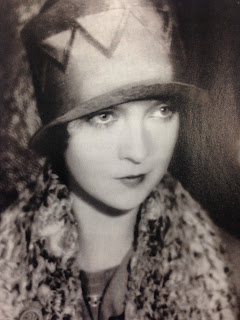"It's Not Only Long - It's Read!" Lillian brushing her hair. She never cut it. circa late 1940s.
2016 – Highlights of The Year in Gish
December 30, 1925 The 90th anniversary of “Ben-Hur” with
Ramon Navarro. The film was released December 30 1925 and many fans did not see
it until 1926. Lillian is among the many MGM stars who saw and thus appeared in
the crowd during the chariot scene.
February 46th anniversary of Lillian Gish's star on the Hollywood Walk of Fame (For film work).
March 2016 100th birthday of playwright Albert Horton Foote, Jr. (March 14, 1916 – March 4, 2009) perhaps best known for his screenplays for the 1962 film To Kill a Mockingbird and the 1983 film Tender Mercies, and his notable live television dramas during the Golden Age of Television, including The Trip to Bountiful starring Lillian Gish as Carrie Watts. (Lillian Gish also played this role in the first Broadway production of "The Trip to Bountiful.") He received the Pulitzer Prize for Drama in 1995 for his play The Young Man From Atlanta and two Academy Awards, one for an original screenplay, Tender Mercies, and one for adapted screenplay, To Kill a Mockingbird. In 1995, In describing his three-play work, The Orphans' Home Cycle, the drama critic for the Wall Street Journal said: "Foote, who died last March, left behind a masterpiece, one that will rank high among the signal achievements of American theater in the 20th century." In 2000, he was awarded the National Medal of Arts.
May 8, 1947 The 70th anniversary of premiere of “Duel
in the Sun” Lillian received an Academy Award nomination for Supporting Actress
August 9, 1926 The 90th anniversary of “The
Scarlett Letter” starring Lillian Gish and Lars Hansen
September 5 100th anniversary of “Intolerance,” premiered
September 5, 1916. Two of the most famous images in silent cinema are from “Intolerance.”
(1) The Babylon Gate and (2) Lillian Gish rocking the cradle of time.
October 14 Lillian Gish’s birthday!
December 1, 1966 the 50th anniversary of “Follow
Me Boys” a Walt Disney production with Lillian in a supporting role.
The fourth Dorothy and Lillian Gish Prize recipient Bob
Dylan (1997) awarded the Nobel Prize in Literature. He did not attend the
awards ceremony.
November 2016 The 23rd Dorothy and Lillian Gish
Prize to Elizabeth LeCompte. Ceremony at the Whitney Museum of American Art,
Manhattan.
October 2016 25th anniversary of Lillian Gish's induction into the Theater Hall of Fame in New York!
August/October 1986 30th anniversary of filming “The
Whales of August” on Cliff Island, Maine.
The film premiere was August 19,
1987. This was Lillian’s last film.
December 2016 “Whales of August” playwright David Barry dies.
December 2016 Death of Fritz Weaver, 90, Lillian’s Broadway
costar in Eugene O‘Neill’s “The Family Reunion.” (1958)
November 2016 Death of Tammy Grimes, 82, Lillian’s Broadway
costar in “A Musical Jubilee” (November 13, 1975-February 1, 1976)
December 16, 2016 Library of Congress, National Film
Registry, selects “The Musketeers of Pig Alley,” cinema’s first gangster film, starring
Robert Harron and Lillian Gish and directed by D. W. Griffith in 1912. The film
premiered October 31, 1912
2017 Events:
30th anniversary of Lillian’s book “An Actor’s
Life for Me!”
30th anniversary of “The Whales of August”
released August 1987.
October 14 Lillian’s birthday!
30th anniversary of The D. W. Griffith Prize to
Lillian Gish.
24th Dorothy and Lillian Gish Prize










